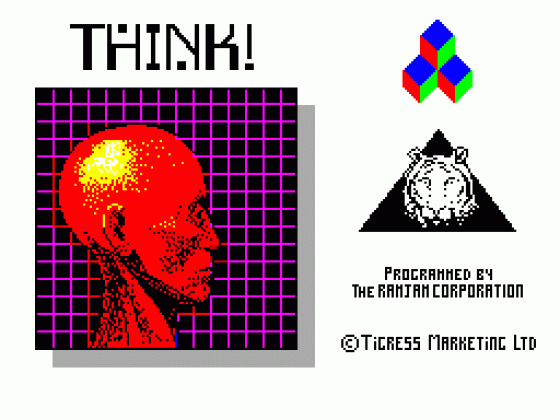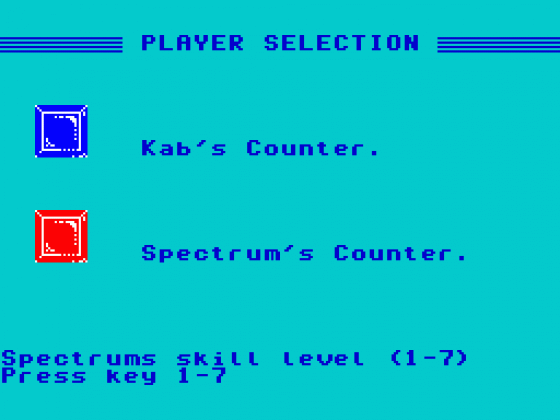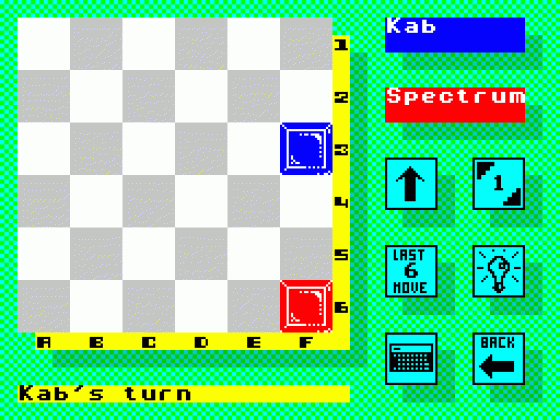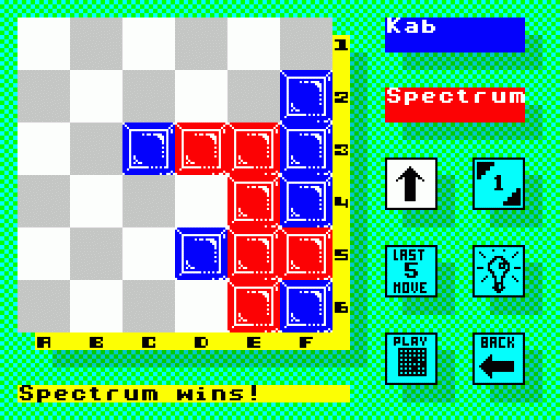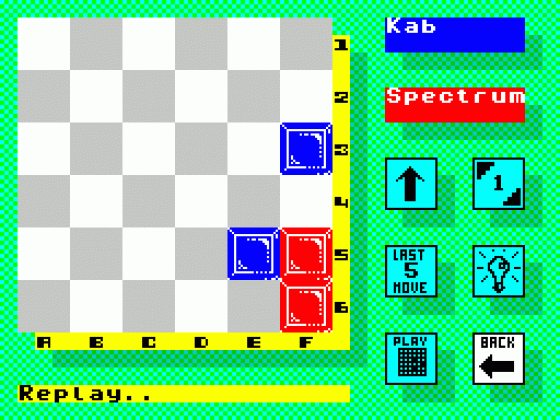
Crash
 1st April 1986
1st April 1986
Categories: Review: Software
Author:
Publisher: Ariolasoft
Machine: Spectrum 48K
Published in Crash #27
Think!
Ariolasoft have moved into the boardgame conversion market with Think! a variant on the Connect 4 theme. The aim of the game, which can be played by two people or solo against the computer, is very straightforward. Players take turns to move a counter onto a six by six grid from the bottom or right-hand edge. If a player gets four counters in a vertical, horizontal or diagonal line then he wins the game, even if the line was produced by the player's opponent and didn't result from a masterly move on the part of the winner.
When a counter is pushed onto the board and enters a row or column which already contains pieces they are all nudged along one square to make room if he row or column already contains six counters, the sixth counter 'falls off' the board The game can be controlled from the keyboard or with a joystick and all option selections except the player's turn are icon-driven. After loading, the main option screen is presented. Using the cursor and pressing fire or ENTER to select icons, the game is configured according to the player's wishes. One or two players can participate. One player can take the computer on in a normal game of Think!, or can choose between the Tutorial and Problem modes.
In the Tutorial game, the human player is allowed to make three attempts at the best move during each turn. If the best choice is made first time, then three points are awarded, two points are given for getting it right second time and one point is collected if the best move is made at the third attempt. At the end of a Tutorial Game the computer reports on the player's performance, giving a percentage rating. The Problem mode allows you to access one of the six inbuilt problems, which have to be solved in two moves, or devise problems of your own by setting up the board. Home-grown problems can be presented to the computer or a friend for solution.
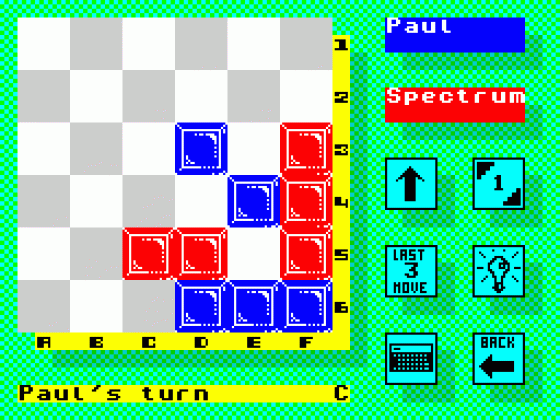
If two players are settling down to a session of Think! they can opt to play a straight game, or can select SPEED Think!, when both players have to make each move within a time limit input at the start. Alternatively, BLITZ Think! can be played, in which each player has a time allocation in which all his moves during that game have to be made if a player runs out of time then the same is lost.
The remaining game control icons on the main option screen allow sound to be toggled on and off, keyboard or joystick to be selected for input, and the colours of the counters used to be set. You can choose your own colours for the counters, accept the default colours or specify black and white if your TV isn't up to full colour display.
If the player(s) are in any doubt about the rules, selecting the Rules Icon provides a quick summary of the salient points and accesses a demonstration sequence which plays a few moves on-screen. Once the options have been configured and the players are ready to do battle, selecting the Play Game icon moves the action to the playing area after a few appropriate questions about time limits and player names have been answered.
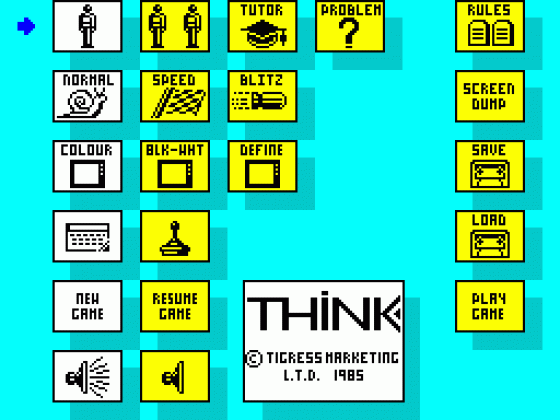
The main screen contains the board itself and a panel of six icons, which give access to the following functions: return to the option screen; display the last move played; force the computer to play the next move; change the computer's skill level; ask the computer to suggest a move and go back over the last two moves.
During play, a bar on the bottom of the screen displays the name of the current player, who must press the appropriate number or letter key to select the entry point for his counter. At the end of a game, all the moves can be reviewed by selecting the BACK icon, and choosing a replay speed from 1 to 9. At any point during a game it is possible to flip to the option screen and save the game to tape or dump the screen to a ZX printer. The game in progress can be resumed, or abandoned and a new game started with the same set-up.
There's certainly plenty of scope for Thinking!
Comments
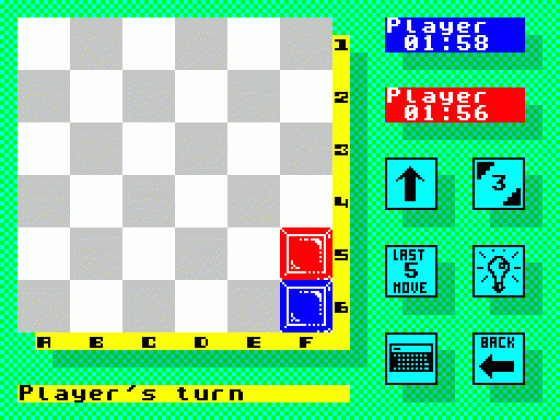
Control keys: SPACE to move cursor down, M cursor up, Enter to highlight icon selected
Joystick: Kempston, Interface 2
Keyboard play: fine
Use of colour: definable colours for counters, well thought out
Graphics: serve their purpose well
Sound: just beeps to confirm selections
Skill levels: seven levels for your computer opponent
Screens: option screen and playing area
Comment 1
'Icons are the latest trend, and Ariolasoft's icon-driven menu is a pleasure to use. It's good to have a nice simple but playable board/strategy game, and this is both original and challenging. As the instructions say, it's easy to pick up, but difficult to master. Essentially, we have a good simple idea, that has been well implemented. Levels One and Two didn't present toooo much of a challenge when I was playing the computer, but as I progressed beyond Level Three I had to give the old brain a good dust down as it got really hard. I suppose lots of people are going to master it, but it gave me a bit of fun for the time I played it, and one thing's for sure: it made me THINK!'
Comment 2
'On receiving this game the first thing I did was think! What on earth could a game called Think be about? On playing the game is became very obvious-what a thinker stinker it is! Think is an excellent variation of the old board game Connect 4 which I love. This is a very polished icon-driven game, and it's very addictive indeed - why can't all games be this well presented? After the shock of the great 'front end' I finally got to the game itself, which gave me a few sleepless hours. Think is a definite test of the old brain cells at the beginning, but after a while I found it quite easy to win on even the harder levels. A small let down: I enjoyed the challenge. Then I realised that if I was careless with my first few moves, the old challenge soon returned. I'd recommend this game to all shoot em up addicts - it'll certainly keep them quiet for a bit'
Comment 3
'Although you might think this game is very complicated and difficult to get into from the reams of instructions on the inlay, it's really very simple indeed. After a few moments getting the hang of the icons, you're away. The game itself is frustratingly complex - although the moves and rules are really simple. I found it very addictive and lots of fun - and good exercise for the grey matter. Well worth getting hold of a copy...'
Other Reviews Of Think! For The Spectrum 48K
Think! (Ariolasoft)
A review by Alison Hjul (Your Sinclair)
Think! (Ariolasoft)
A review by Tamara Howard (Sinclair User)
Think! (Ariolasoft)
A review by Chris Bourne (Sinclair User)
Think! (Ariolasoft)
A review
Think! (Ariolasoft)
A review


